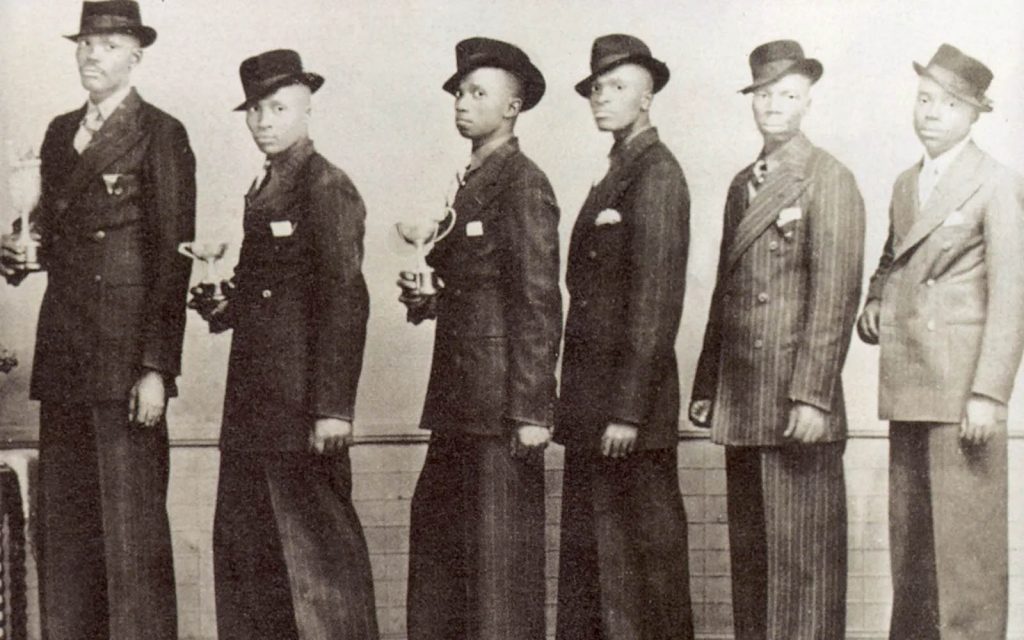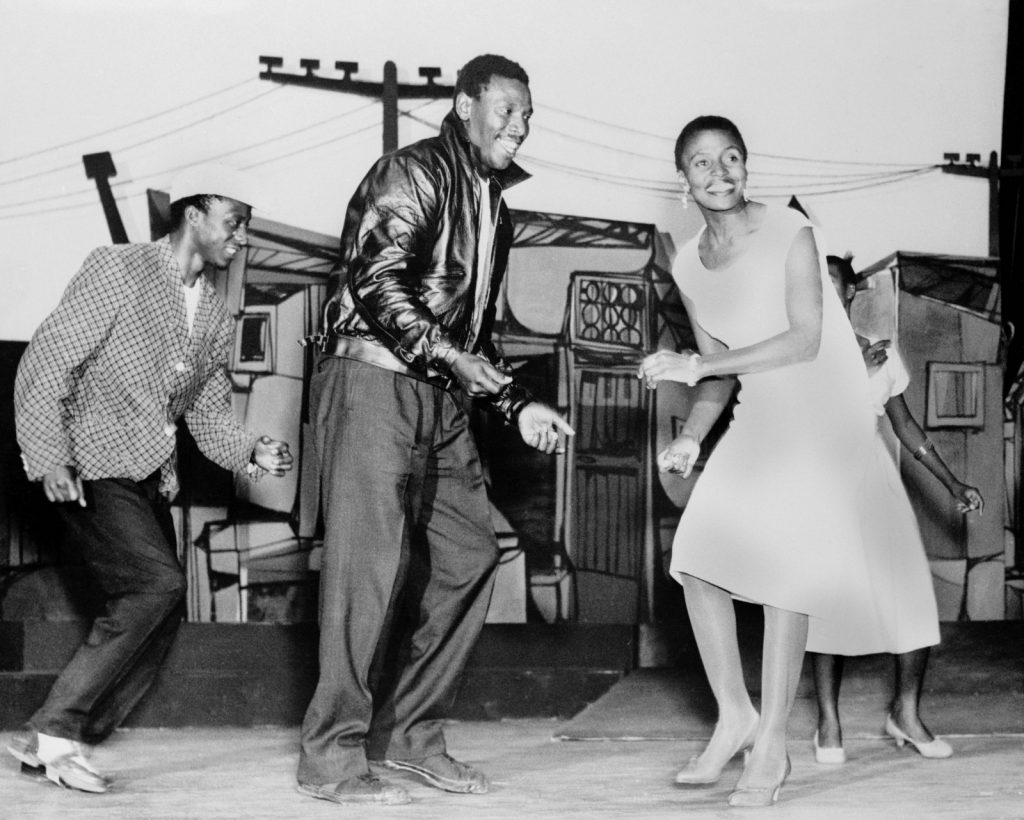Careers of note: The Mahotella Queens perform in Holland in 1987. (Frans Schellekens/Redferns)
Eric Gallo set up the original Gallo Record Company in 1926, with the purpose of importing and distributing music from American label Brunswick Records.
Then, after deciding to start making his own recordings a few years later, Eric set up structures to allow him to record Afrikaans and African music and, in doing so, founded the continent’s first record label.
At the time Gallo, like the other companies that followed shortly after, didn’t record any English South African music because they had import deals which allowed them to access overseas catalogues.
In 1933, Eric invested in the first permanent recording facility in South Africa, which not only allowed him to expand his catalogue, but also gave him a significant advantage over his local rivals.
Over the following years, under the stewardship of Griffith Motsieloa, a local talent scout Eric recruited to find and nurture local talent, Gallo churned out some of the most iconic recordings of its time.
One of the earliest such recordings was Mbube, the 1939 hit single by Solomon Linda. A few years after its release, Mbube found success stateside, where it was adapted and covered by several artists. The Tokens’s version of the song, titled The Lion Sleeps Tonight, became a global hit.
Despite its success, which included its use on the soundtrack of the popular 1990s animated musical drama The Lion King, Linda was not appropriately compensated. By many accounts, he unwittingly signed over his rights to the recording to Gallo Records for a small fee and, in doing so, signed away millions in royalties.
After a complex court battle, a settlement agreement was eventually reached between Disney and Linda’s estate for an undisclosed amount.
This is among the stories told in the Gallo Vault Sessions podcasts. The series, which started rolling out in March as part of the company’s 95th anniversary celebrations, takes listeners through Gallo Records’s rich history as home to some of the continent’s greatest artists.
It also explores themes such as race, expropriation and exploitation. Through the six episodes, Gallo Vault Sessions unpacks the journey of its most successful artists through the lens of the people who were close to the process.
A definitive period for Gallo unfolded in the 1940s in the shebeens and pubs of Sophiatown as jazz music started to take off. It was there that an early hybrid of marabi and pennywhistle jazz, called tsaba-tsaba, began to take shape. This new sound combined traditional African melody with African-American swing and jazz.
Many of Gallo’s most popular acts came onto the scene during this cultural renaissance and were pioneers in the evolution of what we know today as kwela. Led by the likes of Miriam Makeba, Dolly Rathebe, The Manhattan Brothers and The Merry Blackbirds, artists who came up in the bustling Sophiatown scene, this sound spread across the globe in the late 1940s and into the 1950s.
 Solomon Linda (left) and the Evening Birds
Solomon Linda (left) and the Evening Birds
The Manhattan Brothers quartet, in particular, became one of the most sought-after groups on the continent. Around this period Makeba, who was originally recruited to the group, rose to international prominence after the success of the King Kong jazz opera in 1959.
During its international run, King Kong’s cast included Letta Mbulu, Caiphus Semenya, Hugh Masekela and Thandi Klaasen, all of whom were Gallo musicians who would go on to become successful solo acts.
The Gallo Vault Sessions explores this period in great depth in the most recent episode, titled South African Music Goes Global. It shows the ways South African music has proliferated on the international stage and traces a few Gallo-affiliated artists as they and their music traversed the globe.
The episode has interesting anecdotes from the likes of Hilda Tloubatla, lead singer of the acclaimed group the Mahotella Queens, and looks at the impact of the music of Gallo stars Lucky Dube, Ray Phiri and others.
Zara Julius, the social practice artist who produced, researched and wrote the podcasts, shares her experience of realising how far the music had travelled.
“When I went to Colombia, I was listening to Mahotella Queens in bars and in small peripheral areas of Cartagena, which is not what people would assume would be happening. But there are vinyl collectors in Colombia who are properly obsessed with South African music from the 1970s, 1980s and early 1990s.”
During the 1990s, the South African music industry flourished as international sanctions were lifted after the abolition of apartheid.
One group that exploded internationally was Ladysmith Black Mambazo, the brilliant singing group which, over the past three decades, has been nominated for 10 Grammy Awards and won five.
In 1997, Gallo Records famously secured a feature with US singer Dolly Parton on the group’s rendition of Knocking on Heaven’s Door, which helped the group to grow its international footprint.
This episode also grapples with cultural exploitation and appropriation. Apart from the story of Mbube, it explores how Phiri, frontman and guitarist of the group Stimela, contributed to Paul Simon’s 1987 Grammy-winning album, Graceland, but was not correctly credited.
Local jazz star Don Laka explains, “I still believe Ray got a raw deal on that album because the music that he created was not credited for. You Can Call Me Al is complete Ray. Not only that, on many songs, even when he did the album in Jamaica, he was doing the same thing. He’d take people’s music and say it’s his music …
“There was an argument that he put South African music on the map, but at what expense? We need to weigh the pros and cons of Paul’s contribution, or lack thereof.
 ‘King Kong’ with Miriam Makeba.
‘King Kong’ with Miriam Makeba.
“It’s a complex thing what Paul has done, he’s taken people’s music, credited himself, but at the same time, he put their music out there. Some of them benefit up to this day, but others just lost it. It’s a double-edged sword for me.”
The Boyoyo Boys and The Mahotella Queens were also victims over the years as international artists, labels and promoters sought to exploit local talent. Throughout Gallo’s near century-long history, the intellectual property and musical rights has been a constant battle, both internally and externally.
At the dawn of the new millennium, a new breed of artists began to come to the fore and chart their own path under the label. One of them was Simphiwe Dana, whom Julius spoke to for the sixth and final episode (which was yet to be released at the time of writing).
I spoke to Dana about her journey with Gallo and how she first came to know of the company.
“Gallo was one of the three biggest record labels back in the day, so it was hard to not know about it,” she says. “It had all of this music from the 1940s … it was the oldest record label in SA, so they were really hard not to notice.”
Dana recalls how she first met label reps in 2003 when they head-hunted her and offered her a deal.
“They gave me a really good recording deal for the time — most newcomers don’t get that. I had a premium recording deal with them and it afforded me quite a nice budget for the album and for the PR.
“So, that’s something that hardly ever happens, and I’m not sure why it happened for me, but it was very helpful for my career that I had such a good start.”
She made the most of this opportunity, releasing her debut album, Zandisile soon after. It made Dana into a national star and received several awards, including Best Newcomer and Best Jazz Vocal Album at the 2005 South African Music Awards.
“The thing about Gallo is they appreciated and invested in good South African music. And, as much as we had our tussles, they were always about the quality of the music and we always found a way around it because they respected my work. They had a big understanding of how to handle the arts and what to invest in.
“They might have made a few mistakes here and there but, largely, Gallo was one of the few record labels who invested in and appreciated South African music for a really long time.”
Gallo Vault Sessions is a gripping trip down memory lane. It is an immersive experience which offers rare insight into the workings of and complexities around one of the country’s most enduring companies. What’s next remains to be seen.